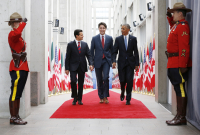Support strong Canadian climate journalism for 2025
President Barack Obama used his speech to Canada’s Parliament to set the table for a strong show of solidarity against Russia at next week’s NATO summit, says the U.S. ambassador to Canada.
"He was sending a strong message, not only to Canada, but to all of our NATO partners that we’re going into Warsaw and we’re looking for everybody to step up and contribute to the level that they’ve committed," Ambassador Bruce Heyman told The Canadian Press on Thursday in a wide−ranging interview on the impact of Obama’s visit to Ottawa a day earlier.
Obama’s chiding of Canada on its commitment to NATO — which stands at about one per cent of GDP compared to the NATO target of two per cent — was one of the few discordant notes in an otherwise celebratory visit to Ottawa.
Heyman said it capped an unprecedented eight−month period of attention by the U.S. on Canada which built a "muscle memory" throughout his government that will keep bilateral relations strong regardless of who replaces Obama in the White House next year.
That’s because the U.S. was focused on preparing for a new government last fall, the March visit by Prime Minister Justin Trudeau to the White House, and then Wednesday’s return visit by Obama to Ottawa for the North American leaders’ summit and his special address to a joint session of Parliament.
With the dust settled on that, Obama and Trudeau and 26 other leaders in the alliance are turning their attention towards their summit next week in the Polish capital, which like many others in Eastern Europe is increasingly nervous about Russian aggression on its border.
In an otherwise effusive and upbeat speech, Obama said he wants to see Canada and its NATO allies contribute more to their common defence, especially in light of Russia’s aggressive posture.
"As your ally and as your friend, let me say that we’ll be more secure when every NATO member, including Canada, contributes its full share to our common security," Obama said. "The world needs more Canada, NATO needs more Canada. We need you."
Defence Minister Harjit Sajjan said Thursday that Canada will lead one of NATO’s four new battle groups being established on the alliance’s eastern flank as part of its stepped up deterrent against Russia.
The move is designed to show Canadian solidarity with NATO against Russia, which has annexed the Crimean Peninsula in Ukraine and backed pro−Russian separatist forces in that country’s eastern region.
But Sajjan added the hope is still to be able to re−establish a dialogue between the 28−country alliance and Russia in an attempt to dial down what is widely seen as the worst conflict between the Kremlin and the West since the end of the Cold War.
Sajjan told The Canadian Press there’s been a lot of "behind the scenes" work to re−open a diplomatic dialogue with Russia.
"This really is the most critical piece. Dialogue is extremely important. We need to make sure the tensions are reduced because it doesn’t help anybody."
Sajjan said Trudeau will outline the specifics of Canada’s contribution to lead one of the four new NATO battalions, comprised of about 1,000 troops each, at the NATO summit. Canada’s battle group is expected to be based in Latvia, a British group in Estonia, a U.S. battalion in Poland and a German battalion in Lithuania, all aimed at helping allay fears among those alliance countries closest to Russia.
NATO secretary−general Jens Stoltenberg tweeted his appreciation Thursday: "Thank you, Canada. All four battalions for #NATO’s east now have a lead nation. Thanks also to GER, UK & US. Strong transatlantic commitment."
In his address to Parliament, Heyman said Obama was trying to emphasize that the U.S. sees the Canadian Forces as "amongst the best in the world and we need you really back, to be a strong participant."
The envoy made clear that military co−operation is just one aspect of a bilateral relationship that has deepened considerably in the last eight months, fuelled by Obama and Trudeau visiting each other.
But beneath the very public Obama−Trudeau dynamic is a massive interplay of government interaction, including at the cabinet level that was on display in Ottawa this week. Secretary of State John Kerry was joined in Ottawa by several cabinet colleagues who all had detailed discussions with their Canadian counterparts, said Heyman.
Then there was the machinery of various U.S. government departments — "the work that thousands of people were toiling each night" — that provided the nuts and bolts foundation underlying the visits, he said.
"It’s the back and forth that built and cemented this muscle connectivity, this muscle memory," Heyman explained.
"Whole teams of people have worked together on so many things that this is laying a real foundation for a very strong Canada−U.S. relationship on the back end of a presidential turnover."



Comments